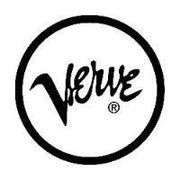Verve Records
| Verve Records | |
|---|---|
 | |
| Parent company | Universal Music Group |
| Founded | 1956 |
| Founder | Norman Granz |
| Distributor(s) |
Verve Label Group Interscope Geffen A&M |
| Genre | Various; historically Jazz music |
| Country of origin | United States. |
| Location | Santa Monica, California |
| Official website |
vervemusicgroup |
Verve Records is an American record company operating under the newly-founded Verve Label Group distributed by Interscope Geffen A&M Records.[1] It was founded in 1956 by Norman Granz. It absorbed the catalogues of his earlier labels, Clef Records (founded in 1946) and Norgran Records (founded in 1953), and material previously licensed to Mercury Records. It has been under ownership of Universal Music Group and has recently expanded to scope newer artists.
History
Norman Granz created Verve to produce new recordings by Ella Fitzgerald, whom he managed; the first album the label released was Ella Fitzgerald Sings the Cole Porter Song Book. [2] The catalog grew throughout the 1950s and 1960s to include Charlie Parker, Bill Evans, Stan Getz, Billie Holiday, Oscar Peterson, Ben Webster, and Lester Young.
By 1960, Granz neared retirement. Milton Rudin, his attorney, represented Frank Sinatra and knew that Sinatra wanted his own label. Sinatra and Granz made a handshake deal, but negotiations broke down over price and Sinatra's desire that Granz remain head of the label. Granz sold Verve to MGM in 1961. Sinatra established Reprise Records and hired Mo Ostin, an executive at Verve, to run it. At Verve, Creed Taylor was made head producer. Taylor adopted a more commercial approach, canceling several contracts. He brought bossa nova to America with the release of Jazz Samba by Stan Getz and Charlie Byrd, Getz/Gilberto, and Rain Forest by Walter Wanderley. Verve's notable arrangers included Claus Ogerman and Oliver Nelson. According to Ogerman in Jazzletter, he arranged 60–70 albums for Verve from 1963–1947.[3]
In 1964, Taylor supervised the creation of a folk music subsidiary named Verve Folkways, later renamed Verve Forecast. Taylor left Verve in 1967 to form CTI Records. Aside from jazz, Verve's catalogue included the Righteous Brothers, the Velvet Underground, Frank Zappa & the Mothers of Invention, and the Blues Project.
In the 1970s, Verve became part of the PolyGram, incorporating the Mercury/EmArcy jazz catalog, which Philips, part owners of PolyGram, had earlier acquired. Verve Records became the Verve Music Group after PolyGram was merged with Seagram's Universal Music Group in 1998. The jazz holdings from the merged companies were folded into this sub-group.[4]
In the 1990s, as part of PolyGram Classics and Jazz, Verve signed Herbie Hancock, Wayne Shorter, Joe Henderson, Roy Hargrove, John Scofield, Shirley Horn, Betty Carter, Abbey Lincoln, Chris Botti, Jeff Lorber, Gino Vannelli, Art Porter, Will Downing, Incognito.
When Universal and Polygram merged in 1998, Verve's holdings were merged with Universal's GRP Recording Company to become Verve Music Group. After forays into Americana and adult contemporary music, Verve was corporately aligned with Universal Music Enterprises (UMe), and was no longer a stand-alone label within UMG.
The Verve imprint itself manages much of the jazz catalog that once belonged to PolyGram (not including recordings by Herb Alpert for his A&M Records label which Alpert acquired in a legal settlement with Universal Music and are licensed to Shout! Factory),[5] while the Impulse! Records imprint manages the portion of Universal's catalog that was acquired from ABC Records, which itself includes the jazz catalog of the Famous Music Group, which was once owned by Paramount Pictures/Gulf+Western, but which was sold to ABC in 1974. Meanwhile, GRP manages the rest of MCA/Universal's jazz catalog, including releases once issued on the Decca and Chess labels.
The Verve Music Group has expanded its output beyond jazz to include crossover classical music, progressive pop and show tunes (by absorbing Decca Records' Broadway label and thus taking over ownership of the label's library, including EMI's, MGM Records' and MCA Records' musical theater catalogs).[6][7]
Discography
References
- ↑ Gioia, Ted (14 March 2015). "The record label of Billie Holiday and Ella Fitzgerald just got swallowed by a hip-hop business… and no one even noticed!". The Daily Beast. The Daily Beast. The Daily Beast. Retrieved 24 January 2017.
- ↑ Maxwell, Tom (November 2016). "The Story of ‘Ella and Louis,’ 60 Years Later". Longreads. Longreads.com. Retrieved 21 November 2016.
- ↑ "The Work of Claus Ogerman". Bjbear71.com. Retrieved 2013-02-28.
- ↑ Archived May 1, 2009, at the Wayback Machine.
- ↑
- ↑ Duquette, Mike (2013-10-31). "Happy Halloween! "Wicked" Turns 10, Celebrates With Deluxe Reissue". Theseconddisc.com. Retrieved 2017-07-21.
- ↑ "Our Labels & Brands - UMG". Universalmusic.com. Retrieved 2017-07-21.